 Vorpremiere: 28.06.2009, 18:00 Uhr.
Vorpremiere: 28.06.2009, 18:00 Uhr.Filmmuseum Potsdam, Marstall / Breite Str. 1A, 14467 Potsdam.
Filmprojekt und audiovisuelle Installation
blankfilm
Politik, Kultur, Geschichte, Wirtschaft, Internet und andere Aspekte über den Süd-Kaukasus // Politic, Culture, History, Economy, Internet And Other Aspects About South-Caucasus // Re-Blogged & Posted By Ralph Hälbig
 Vorpremiere: 28.06.2009, 18:00 Uhr.
Vorpremiere: 28.06.2009, 18:00 Uhr.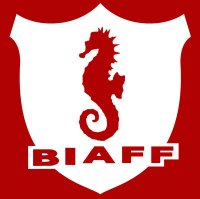 BIAFF (Batumi International Art-House Film Festival) in 2009 is adding the "Young Film Maker's compeition section".
BIAFF (Batumi International Art-House Film Festival) in 2009 is adding the "Young Film Maker's compeition section".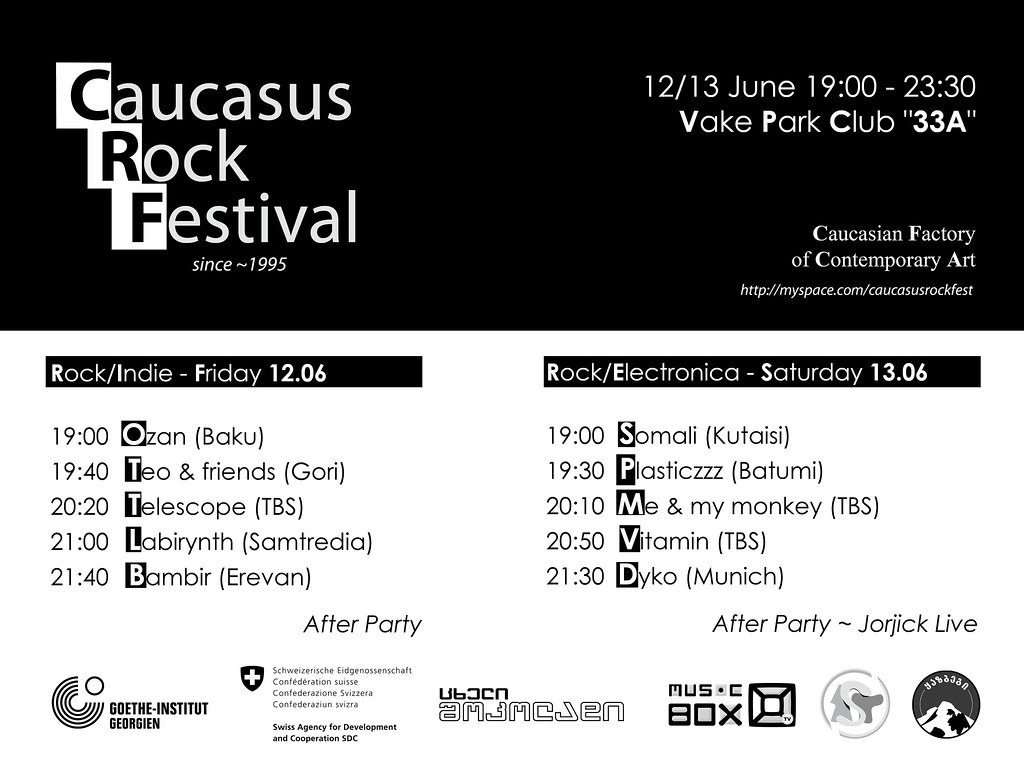
 Today I had a nice chat with Irina. She has got a huge price in Italy for her artwork. It is amazing! Congratulation for her! More you can read here in the catalog >>>
Today I had a nice chat with Irina. She has got a huge price in Italy for her artwork. It is amazing! Congratulation for her! More you can read here in the catalog >>>PREMI: 3rd International Art Prize Arte Laguna
Special Mention of the President of the Jury for the best foreign Artist (sculpture section)
Virtual Jury Special Prize (sculpture section)
Irina Gabiani was born in Tbilisi, Georgia, in 1971.After studying at the Academy in Tbilisi, Irina moved to Amsterdam where she studied at the Gerrit Rietveld Academy (“Free direction” and “Contemporary jewellery”). Irina has lived and worked in Luxembourg since 1998.
The Universe in its holistic essence is the focus of the research of the artist according to whom we all belong to a unique system, to a “big organism” imagined as a kind of complex, interrelated chain, of which we, and everything around us, are a part.
Trying to see beyond what we can perceive with our eyes, going beyond the vision of the world as we use to know, the artist researches the innumerable similarities between the infinitely big and the infinitely small within matter. The two “worlds” look as though they mirror one another. The more we know matter and understand its complexity which escapes us at a simple glance, the more the infinitely small leads us to the universe. For this reason, especially in her recent works, images of the micro and macro universes appear one next to the other and, sometimes, the images from the micro exceed the dimension of those from the macro. Discovering infinite worlds within our every-day surroundings leads the artist to believe that there are other parallel realities in time and space.
In her works, Irina uses drawing, painting, photography and sculpture, often in porcelain or ceramics.
Web site: irina-gabiani.livejournal.com
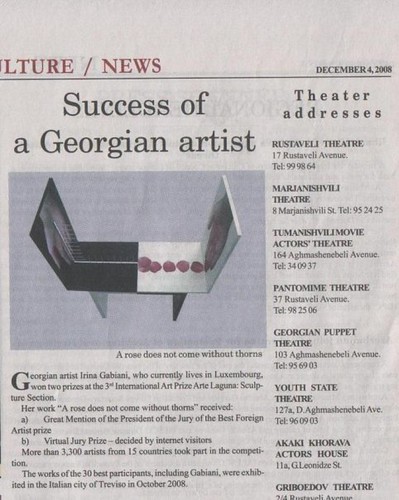
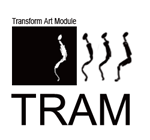 TRAM (Transform Art Module) Foundation – a Georgian, non-governmental, non-profit organization, which has several years of experience in the field of contemporary art as an informal group uniting an ever expanding number of artists and organizing cultural events utilizing innovative ideas, platforms and venues. Building on this experience, we have decided to organize formally around same goals of advocating and popularizing contemporary art and supporting its development in Georgia through assisting Georgian artist, promoting cooperation between Georgian and foreign artists, especially from the neighboring countries, and supporting modern business practices in the cultural field.
TRAM (Transform Art Module) Foundation – a Georgian, non-governmental, non-profit organization, which has several years of experience in the field of contemporary art as an informal group uniting an ever expanding number of artists and organizing cultural events utilizing innovative ideas, platforms and venues. Building on this experience, we have decided to organize formally around same goals of advocating and popularizing contemporary art and supporting its development in Georgia through assisting Georgian artist, promoting cooperation between Georgian and foreign artists, especially from the neighboring countries, and supporting modern business practices in the cultural field.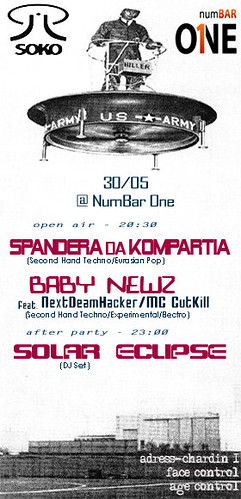 Tbilisi. Shardeni Street 1 - club "NumBar ONE" art-group ELY and indiependent label SOKO presents: Second hand, Eurasian electronic event
Tbilisi. Shardeni Street 1 - club "NumBar ONE" art-group ELY and indiependent label SOKO presents: Second hand, Eurasian electronic event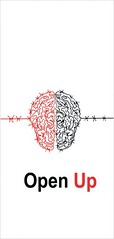 Turtle Like road, Tbilisi. (Painting, sculpture, photography, video, installation, poster)
Turtle Like road, Tbilisi. (Painting, sculpture, photography, video, installation, poster)  Anthony Suau was born in the United States in 1956 and was graduated from Rochester Institute of Technology in 1979. Currently based in Paris, France he has continued his work in Russia, the Middle East and Europe as a TIME contract photographer. In January 2001 he began work on a major project in the United States with the inauguration of current President George W. Bush. Between 1979-1981 he was a staff photographer for the Chicago Sun-Times and the Denver Post and was awarded the Pulitzer Prize in 1984 for his images on the famine in Ethiopia. His work from covering the reaction to the terrorist attack on the World Trade Center can be viewed at time.com. In 1991, Suau became a contract photographer for TIME Magazine and began distributing his work though 10 separate agencies including Grazia Neri in Italy, Visum in Germany, Network in London and Liaison in the United States. In 1996 he was awarded the Robert Capa Gold Medal for documenting the war in Chechyna Russia. He has authored two books: one on the war in Chechyna, and the other on the genocide in Rwanda. In September 1999, his 10-year project entitled "Beyond the Fall", documenting the transformation of the former Soviet bloc, opened with a series of exhibitions and co-edition book in Washington, D.C., Milan, Berlin, Moscow, London, Budapest, Bilbao and New York. A book and exhibition entitled "Between Worlds: Kabul/New York," which juxtaposes photographs made in the aftermath of New York's 9/11 with those he made in Kabul immediately following the withdrawal of the Taliban in November of the same year will debut February 8 through April 13, 2003 at the Museum of the City of New York. His home page is at www.anthonysuau.com.
Anthony Suau was born in the United States in 1956 and was graduated from Rochester Institute of Technology in 1979. Currently based in Paris, France he has continued his work in Russia, the Middle East and Europe as a TIME contract photographer. In January 2001 he began work on a major project in the United States with the inauguration of current President George W. Bush. Between 1979-1981 he was a staff photographer for the Chicago Sun-Times and the Denver Post and was awarded the Pulitzer Prize in 1984 for his images on the famine in Ethiopia. His work from covering the reaction to the terrorist attack on the World Trade Center can be viewed at time.com. In 1991, Suau became a contract photographer for TIME Magazine and began distributing his work though 10 separate agencies including Grazia Neri in Italy, Visum in Germany, Network in London and Liaison in the United States. In 1996 he was awarded the Robert Capa Gold Medal for documenting the war in Chechyna Russia. He has authored two books: one on the war in Chechyna, and the other on the genocide in Rwanda. In September 1999, his 10-year project entitled "Beyond the Fall", documenting the transformation of the former Soviet bloc, opened with a series of exhibitions and co-edition book in Washington, D.C., Milan, Berlin, Moscow, London, Budapest, Bilbao and New York. A book and exhibition entitled "Between Worlds: Kabul/New York," which juxtaposes photographs made in the aftermath of New York's 9/11 with those he made in Kabul immediately following the withdrawal of the Taliban in November of the same year will debut February 8 through April 13, 2003 at the Museum of the City of New York. His home page is at www.anthonysuau.com.


Paul Rimple descriped Shalva Natelashvili as "a drunk, every country needs a blabber-mouthing populist. [...] Although Natelashvili received a generous ovation, the show stealer was Utsnobi, who entered the stadium on the shoulders of his disciples. After his teary-eyed victory lap, the rock and roll political activist ran out to the giant Georgian flag on the middle of the pitch, prostrated himself and kissed it, to the cheers of the crowd.In 2001, Speaker of Parliament, Zurab Zhvania told a group of university students that when he and his friends dared think of the future in the 1980s, the equation was black and white. "We always deeply believed that as soon as communism ends, as soon as we are separated from Moscow, Georgia will automatically become a country like Switzerland or Belgium," he stated.
The late Rose Revolutionary said that such a concept was an illusion that cost thecountry a lot. It is an illusion that continues today as the opposition sends the same message to thousands of dissatisfied people. Vote for us and everything will be OK before the next wine harvest.

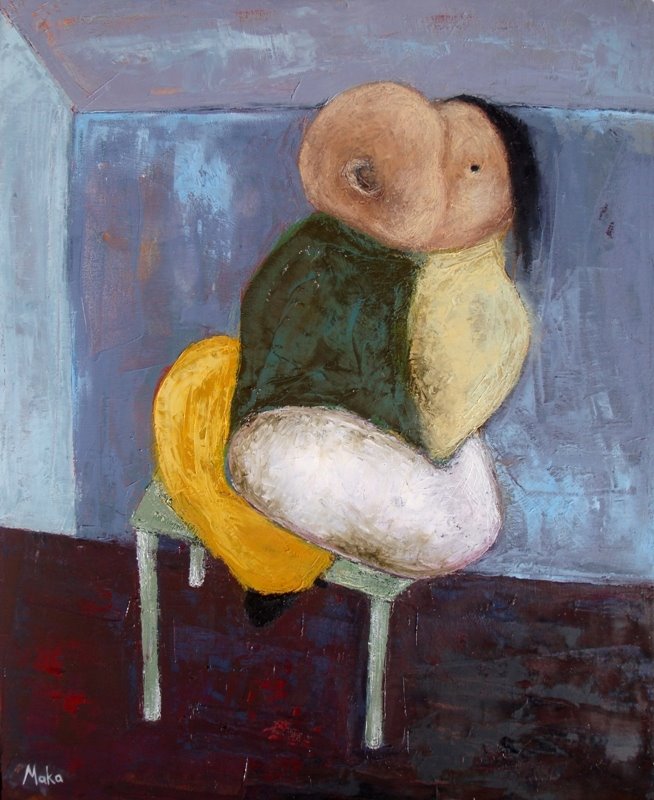
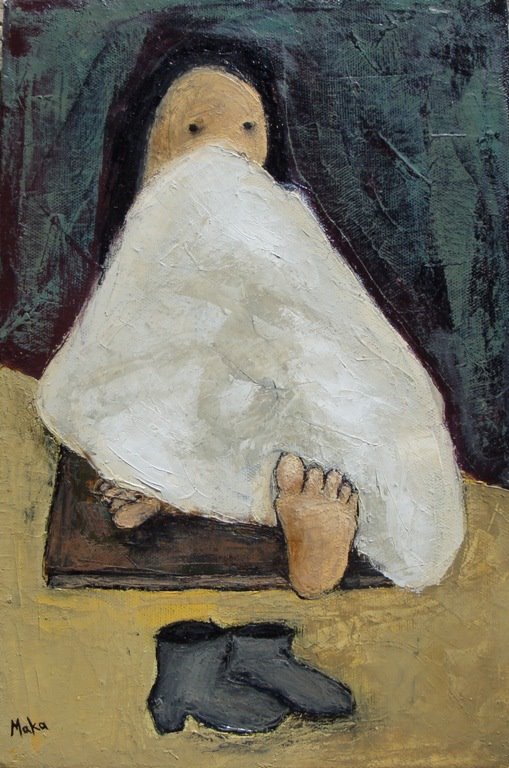
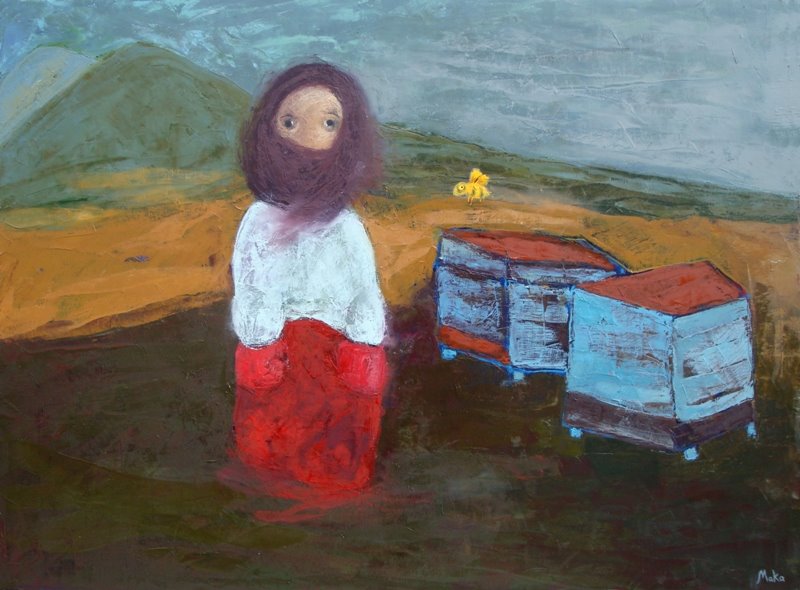 more from Maka Batiashvili >>>
more from Maka Batiashvili >>>

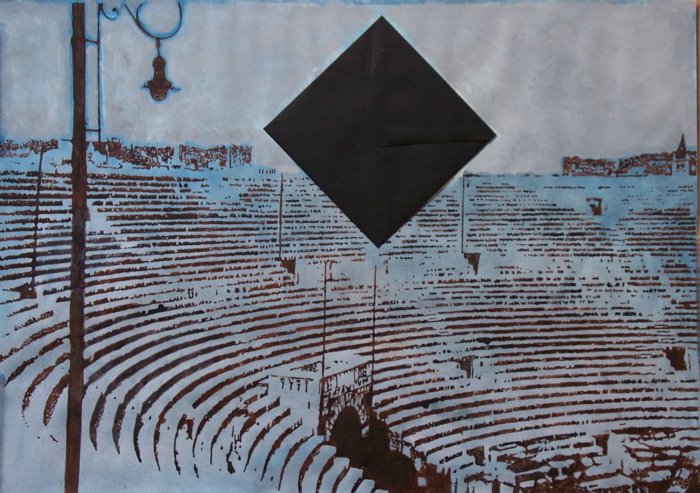 My friend the georgian artist Lado Pochkhua finished some works in Budapest in his studio. All the time I would like to publishing some works here. In the last night I uploaded some works on my flickr account. And today I could see the rally in the football stadion in a short clip of civil.ge (Tens of thousend rally / and one man >>>). This painting haven't to doing anything with that. But interesting for me is the association between the expression of this painting and the painful performance for the official world from the single opposition guy in the centre of the arena today. Maybe he have seen to often the fiction of Spartacus in his childhood. For me it is not a trustfull event. Georgia need more reflectiveness! Georgia needs more trust and rest!
My friend the georgian artist Lado Pochkhua finished some works in Budapest in his studio. All the time I would like to publishing some works here. In the last night I uploaded some works on my flickr account. And today I could see the rally in the football stadion in a short clip of civil.ge (Tens of thousend rally / and one man >>>). This painting haven't to doing anything with that. But interesting for me is the association between the expression of this painting and the painful performance for the official world from the single opposition guy in the centre of the arena today. Maybe he have seen to often the fiction of Spartacus in his childhood. For me it is not a trustfull event. Georgia need more reflectiveness! Georgia needs more trust and rest! Published: May 25 / Deadline: Jun 16
Published: May 25 / Deadline: Jun 16 The Chorleader Tamar Buadze from Rustavi (left) - photo Ralph Hälbig
The Chorleader Tamar Buadze from Rustavi (left) - photo Ralph Hälbig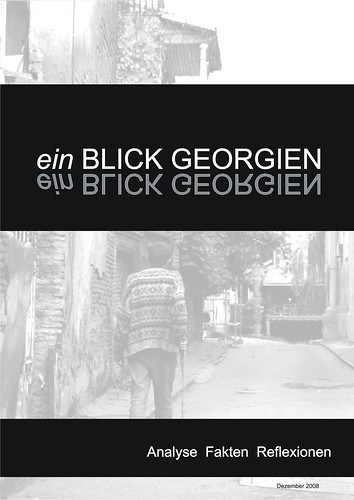 Buch: ein Blick Georgien. Analyse, Fakten, Reflexionen. (Hrsg. von Marika Lapauri-Burk)
Buch: ein Blick Georgien. Analyse, Fakten, Reflexionen. (Hrsg. von Marika Lapauri-Burk)Tweets by SouthCaucasus1/ Here are the new trips from „Kaukasus-Reisen“ @kaukasusreisen for #Georgia, #Armenia and #Azerbaijan for 2023 in English!
— Notes from Georgia/South Caucasus (Hälbig, Ralph) (@SouthCaucasus) November 22, 2022
If you know someone who is interested in spending next year's #holidays in the #Caucasus region, please share! #Travel #Tourism #Adventure pic.twitter.com/upjKg0imdX